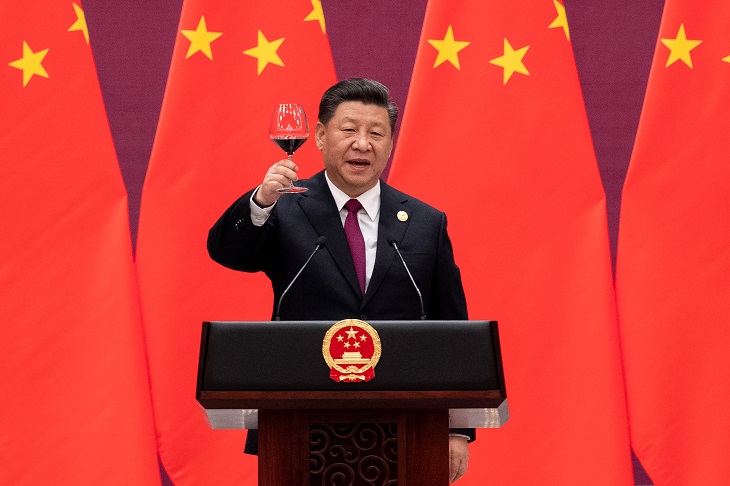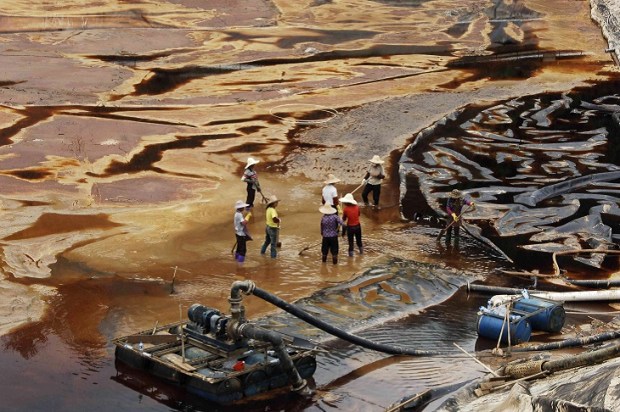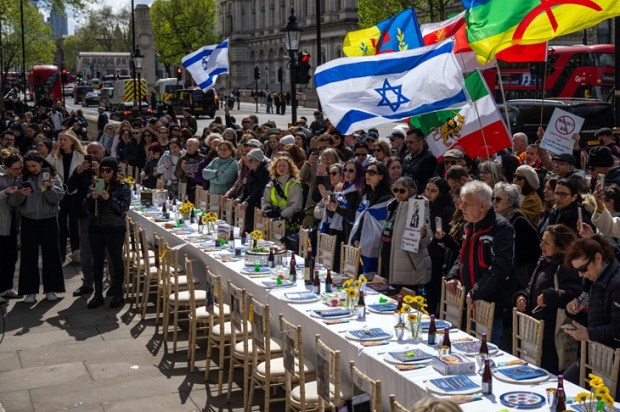Pick up a politician – give them a little shake – and a few Chinese billionaires will probably fall out of their pockets.
We have no idea how much influence the Communist Party of China has over the current Australian political landscape. All we know is that they spent decades establishing themselves as the shadows that stalk the halls of parliament.
Removing China’s presence in our political system would resemble the internet spider meme where the only viable solution to freshly hatched Tarantulas is to burn the whole house down. I’m not suggesting kerosene and matches, but a few healthy election clean-outs might be in order.
When he was Attorney-General, Christian Porter made a half-hearted effort with his Foreign Influence Transparency Scheme (started in 2018).
As a piece of legislation, it contained the same mistake as Australia’s terrorism laws, which were written as a non-specific framework to deal with a specific problem. In trying to remain politically sensitive, dangerous ideas ripe for misuse found their way into law. Where terror legislation (designed to address Islamic terror) was misappropriated to silence Freedom protesters, the Foreign Influence Scheme was wielded against CPAC – a conservative forum – and ex-Prime Minister Tony Abbott.
The result is an Australia that finds itself saddled with a piece of toothless legislation and a whole stack of Australian politicians that were either willingly bought by China or caught up in its web in less flattering ways.
Porter’s empty growl in Beijing’s direction was a reactionary measure to calm public outrage after the dramatic casualty of Labor Senator Sam Dastyari’s career when money changed hands between him and the exiled Chinese billionaire and property developer Huang Xiangmo.
This would be the same Huang Xiangmo that bankrolled New South Wales Labor leader Chris Minns’ little undeclared trip to Hong Kong back in 2015 when he was a newly elected MP. He was accompanied by Labor’s energy spokesman Chris Bowen and his wife. According to Chris Minns, when he went to declare the trip, he was told that it fell outside the declaration period.
Huang Xiangmo, on the run with an eye-watering tax bill, donated a fortune to Labor and Liberal campaigns despite an ASIO warning. He founded former Foreign Minister Bob Carr’s heavily criticised Australia-China Relations Institute in 2013 and boasted then-Labor leader Bill Shorten as the guest of honour at his daughter’s wedding. He now resides in one of the most expensive properties in Hong Kong having been appointed to a special committee tasked with finding ‘Chinese patriots’ to rule over Hong Kong and crush the remaining democracy protesters. Charming.
Despite Chris Minns insisting that the undeclared trip was about trade, his maiden speech to parliament shortly after returning included the inappropriate and bizarre suggestion that Mandarin should be made compulsory for all students from kindergarten through to Year 12. Where did this idea come from? It was an extraordinary proposition that was seen as ‘interference’ by China – even if only through the power of suggestion.
Chris Minns has since apologised for it, saying that it was a ‘mistake’ that he ‘regrets’.
‘At the time I was looking at the economic size of China, the growth of their economy, the potential. I realised even a small fraction of trade with China would bring billions into the Australian economy, the NSW economy. But I was wrong,’ said Chris Minns. ‘The remarks came just a year after President Xi Jinping had been elected, before the protests in Hong Kong and before the coerced labour of Uyghurs.’
The comments did not come before the ethnic persecution of the Tibetan people and the Red Armband Patrols of 2012 under President Hu Jintao or Spain’s indictment of Jintao in 2013 for torture, genocide, and crimes against humanity. Nor did they precede the beginning of Chinese persecution against the Uyghur people in 2014 when the first disturbing policies were drawn up. Violence in the region was well underway by 2009 in response to ongoing discrimination and complex regional land disputes.
It was also certainly after then-Labor Australian Defence Minister Joel Fitzgibbon’s two undeclared trips to Beijing and Shanghai in 2002 and 2005 respectively, paid for by Helen Liu which came to the attention of Australian intelligence officers. Fitzgibbon later apologised for them, describing his actions as ‘untidy’. He famously criticised Scott Morrison (acting Treasurer at the time) for blocking the sale of Australia’s largest cattle farm representing 1.3 per cent of Australia’s total land area to two warring Chinese companies.
Chris Minn’s comments didn’t come before China’s ongoing persecution of Christian and Catholic worshippers or the banning of Falun Gong. By 2015, it was widely known that China spied on ex-pats, students, and tourists while abroad including through the use of communication apps. Australian university lecturers had begun to raise the alarm of students policing other students on behalf of China. Chinese money, if not fear, was well on the way to corrupting education facilities that were happy to take cash in exchange for sub-standard work.
As for believing current president Xi Jinping would be a ‘benign’ ruler, his rise to power in 2012 involved a reign of terror in which thousands of political rivals vanished – many presumed murdered – while he issued threats to those that remained. Hundreds of human rights lawyers were locked up by Xi Jinping along with anyone critical of the Communist Party. A year later, in 2013, the militarisation of the South China Sea alerted Washington to a new and dangerous China with a leader that described himself as ‘the reddest of red’.
‘To dismiss the history of the Soviet Union and the Soviet Communist Party, to dismiss Lenin and Stalin, and to dismiss everything else is to engage in historic nihilism. It confuses our thoughts and undermines the party’s organisations on all levels,’ said Xi Jinping in Shenzhen, 2012.
We could go on about the network of young women employed to honey-trap politicians, or even start walking back through the years to Tiananmen Square, but the point is that failing to identify the Chinese Communist Party as a bad actor would take an extraordinary amount of idiocy.
Something else happened at the beginning of Xi Jinping’s presidency – the creation of the Belt and Road project which drew foreign governments and corporate investors toward China. It didn’t seem to matter how many bodies had to be clambered over on the way to a lucrative contract. Australian politicians put their blindfolds on and started crawling.
China played a bit of ‘Marco-Polo’ with them, sending representatives to make ego-flattering speeches using only the thinnest veneer of gold plating before proceeding to dangle cold hard cash in front of elected MPs if they wavered. It appears that most were swayed, on both sides of the political fence. They took the money and averted their eyes from the real China and its geopolitical intent wrapping around parliament.
It is increasingly difficult to take the forced apologies of politicians seriously – apologies only issued after their indiscretions with China were brought out and limped through the press, whimpering and sulking like a puppy with its nose pushed down onto a past mess.
Australia has a political culture of politicians enjoying five-star lives as pseudo-celebrities, jetted around by China. The Communist Party knows that for all the preaching of Western politicians as ‘men and women of the people’ what they really want is to live like gods. China has taken great pains to treat Australian politicians and their families as royalty in exchange for influence and information – in some cases, they genuinely turn them around into a state of ‘worship’ where politicians voluntarily support Chinese interests over Australia long after their careers are finished.
Politicians that are bought, manipulated, or otherwise influenced by China are no better than those that would hold the gates of Rome open to the barbarian conquerors. Five minutes later you can bet they will be sobbing, confused as to why their home is burning alongside everyone else’s.
Australian MPs have been cultivated like a bamboo forest, only to be cut off and harvested when opportune for China’s nation-building scaffolding.
So please, save us the false tears and pretend remorse.
Alexandra Marshall is an independent writer. If you would like to support her work, shout her a coffee over at donor-box.
Got something to add? Join the discussion and comment below.
Get 10 issues for just $10
Subscribe to The Spectator Australia today for the next 10 magazine issues, plus full online access, for just $10.

























Comments
Don't miss out
Join the conversation with other Spectator Australia readers. Subscribe to leave a comment.
SUBSCRIBEAlready a subscriber? Log in